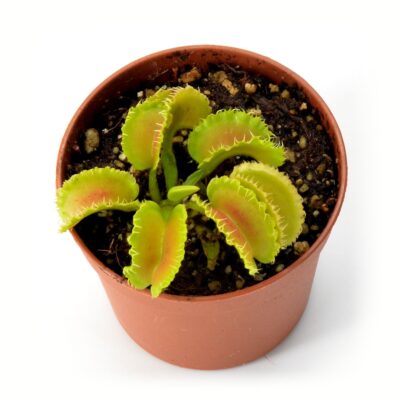Rooting powder with mycorrhizae
3.55€ *Natural rooting powder with mycorrhizae enhances root development in herbaceous and semi-woody cuttings. Not a phytosanitary product.
++ 30% off on all Venus flytraps with double traps – Click here
++
For beginners & collectors
Access to rare varieties
Fast shipping
Environmentally friendly
We offer a wide variety of substrates to choose from, including potting mixes, aquarium gravel, and sand. Whether you’re growing indoors or outdoors, in a pot or in the ground, we have the substrate you need to help your carnivorous plants thrive.
Showing 1–28 of 33 results


Natural rooting powder with mycorrhizae enhances root development in herbaceous and semi-woody cuttings. Not a phytosanitary product.


Blonde Sphagnum Peat is the substrate par excellence, used for growing our carnivorous plants, usually mixed 50/50 with perlite.


Kanuma (2/5 mm): Keeps the soil moist, aerated and more acidic than akadama. Can be used to increase the supply of nutrients.


Coconut fiber is light, well-ventilated and oxygenated, has excellent drainage, stable pH, retains moisture, and is environmentally friendly and recyclable.


Red volcanic lapillus (3-5mm), porous rock for carnivorous plants. Not inert; suitable for species tolerating soil salinity. Formed from lower-silica magma.


Seramis is an ideal substrate for various carnivorous plants. The high porosity maintains perfect moisture and supports various fertilizers.


Akadama literally means “Red ball soil” and is a volcanic clay collected at a depth of 3 meters in Japan. Remove organisms and pests.


Tuff fine size is a mineral substrate used mainly for Pinguicula cultivation, either alone or mixed with other mineral compounds or with peat and agriperlite.


Substrate studied and tested by Diflora for optimal cultivation of Heliamphora. 30% parts pumice, 30% parts perlite, 40% parts peat.


Substrate studied and tested by Diflora for optimal cultivation of Nepenthes growing on mineral soils. Kanuma, akadama, lapilli and peat.


The tuff (8-14 mm) is a volcanic rock with a high content of SiO2, Al2O3, K2O. It resists oxidation/hydration and has several minerals within it.


Substrate studied and tested by Diflora for optimal growth of Cephalotus follicularis composed of 30% pumice, 30% quartz and 40% peat.


Kiryuzuna: Japanese zeolite from volcanic gravel. pH 6.5-6.8, ideal for acid-loving plants. Collected, dried, heated, and pulverized.


Substrate for Cephalotus (premium) is studied and tested by Diflora for optimal growth of Cephalotus follicularis. Seramis, pumice, perlite,quartz, peat.


Pine bark in substrates is very useful for aerating the substrate; it is used for growing Nepenthes, Brocchinia and Catopsis.


Basacote (6M): Granular fertilizer, slow release rate, low in macro and microelements content. Suitable for use with certain types of carnivores.

Algaren Twin is an algae-based liquid fertilizer that stimulates plant growth. It improves roots, flowering, soil health and stress resistance.


Agriperlite increases soil aeration for carnivorous plants. Mixed with sphagnum peat, it is an inert, expands 20 times and is microbiologically safe.


Vermiculite is the ideal substrate for pinguiculae growth. Lightweight, eco-friendly, high porosity, water retention and thermal insulation properties.


Ketotsuchi is a versatile Japanese humic/clayey growing medium, essential for bonsai and various plant arrangements like for the aquarium.


Pumice (2-4 mm) is a porous rock, suitable for growing carnivorous plants that like a moist but aerated substrate. Pumice it is not an inert.


Trichoderma hyperconcentrate powder enhances plant health by preventing abiotic stress. Contains beneficial microorganisms. Suitable for various plants.


Basacote (3M): Granular fertilizer, slow release rate, low in macro and microelements content. Suitable for use with certain types of carnivores.


Zeolite is a mineral substrate mainly used for the cultivation of Pinguicula and other plants wich tolerate mineral soils.


Basacote (12M): Granular fertilizer, slow release rate, low in macro and microelements content. Suitable for use with certain types of carnivores.


Silica sand is a substrate used in mixes with other substrates, for the cultivation of Pinguiculae, tuberous and petiolate sundews and others.


Substrate studied and tested by Diflora for optimal growth of Pinguicula, composed of 50% pumice, 30% lapilli and 20% peat.


Substrate studied and tested by Diflora for optimal cultivation of all sundew species growing on mineral soils, composed of 40% peat, 20% quartz, 20% lapilli, and 20% kanuma.


Heliamphora minor, a carnivorous plant from Venezuelan Tepui, thrives in tropical highland conditions, but adapts well to most crops.


Pinguicula sp. Tolatongo: Mexican and tropical small, purplish plant with folded white-tipped lobes. Ideal for beginners. Prostrate shape.


Blonde Sphagnum Peat is the substrate par excellence, used for growing our carnivorous plants, usually mixed 50/50 with perlite.


Blond peat of sphagnum moss and perlite, mixed to 50%. The classic appropriate mix to make many carnivorous plant grow at their best, prepared by our staff.


Dionaea muscipula “Kim Il Sung”: Unique, aggressive form. Striking, distinctive appearance with irregular teeth and wavy forms. A must-have for fans!


Dionaea muscipula ‘Alien’ is a giant prostrate plant with elongated, bean-shaped, and arched traps. One of the most notable features of this cultivar’s traps is their dentition, which vaguely resembles the teeth of a monster or an alien. The “teeth” of the traps are often fused together at the base, creating a jagged and irregular appearance.


Pinguicula laueana (Crimson Flower): Tropical carnivorous plant, dark green leaves, stunning red flowers. Great for beginners.


Drosera rotundifolia is easy to grow; it has green leaves, the trap is green but if it is exposed to full sun it turns slightly red.


Agriperlite increases soil aeration for carnivorous plants. Mixed with sphagnum peat, it is an inert, expands 20 times and is microbiologically safe.


“Dionaea AR Werewolf”: upright clone with dark red color, narrow petiole, and stubby-toothed traps. Wavy and irregular. Striking yellow-orange leaf edge.
For beginners and collectors
Access to rare and unusual varieties
Sustainable & environmentally friendly
Fast and secure international shipping
Stay up-to-date with the latest news and offers from Diflora! By subscribing to our newsletter, you’ll be the first to know about new arrivals, exclusive promotions, and expert tips on how to care for your plants.
No products in the cart.
Recently viewed products: